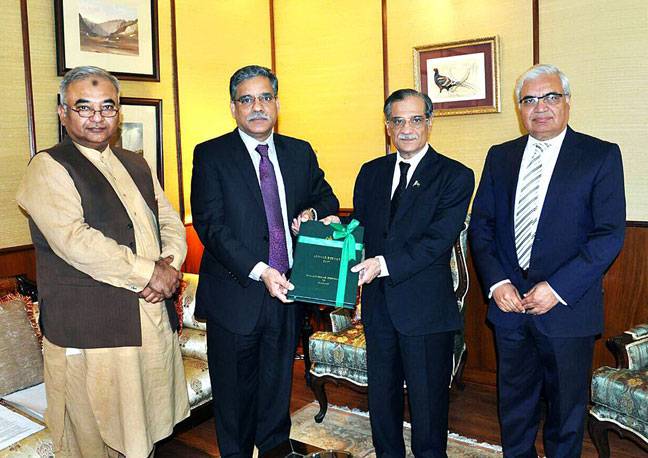ISLAMABAD - Chief Justice Mian Saqib Nisar Monday said that criminal proceedings will be started against those who had permitted cement factories to extract sub-soil water of Katas Raj, causing billions of rupees loss to the national kitty besides causing an environmental hazard and creating a shortage of water in the area.
The chief justice also hinted to refer the matter to the National Accountability Bureau.
A three-judge bench headed by Chief Justice Mian Saqib Nisar and comprising Justice Umar Ata Bandial and Justice Ijazul Ahsan took up the suo moto case regarding drying pond of Katas Raj temple and the use of water resources by cement factories for commercial purpose.
The top court also summoned director generals of the Environmental Protection Agency (EPA), who served from 2004 till date and permitted owners of cement factories to use the water for commercial purpose, at the next hearing.
The top court also directed the Punjab government to ensure the presence of former secretary industries Fiaz Bashir Warraich at the next hearing. The chief justice observed that even if these officers particularly secretary industries were retired or whatsoever they will have to appear in the court.
Additional Advocate General Punjab Asma Hamid represented the Punjab government and advocate Makhdum Ali Khan represented Bestway Cements, which has two plants in the area.
The chief justice observed that those who utilized millions of gallons of water costing billions of rupees shall be recovered and the money would be spent on the welfare of the people living in the area.
Expressing his dissatisfaction over the irresponsibility of factories’ owners for not realizing their corporate social responsibility, the chief justice observed that had this not been the matter of China Pakistan Economic Corridor, he would have ordered for closure of factories in a second. He added that the owners were exploiting this aspect.
Justice Bandial observed that cement factories’ owners were businessmen and they were not bothered about the public interest but the Punjab government should, at least, protect the public interest. The chief justice also lamented on the extension of factories and observed that the area was the community’s religious place but the factory owners had not even thought about their rights. When advocate Khan argued that they had sought permission before the expansion, the chief justice asked as to who permitted the expansion and further queried to cite a provision of the law. Khan responded that his client, like other factory owners, sought permission from authorities. He further explained that Punjab government’s EPA granted permission for the expansion and installation of tube-wells.
The chief justice wondered how could a low-ranked officer of the EPA permit the utilization of water of thousands of gallons. The judge, however, observed that the court has no caustic thoughts as cement was necessary and several employees work there, but the owners should also have realized their social responsibility. Advocate Khan tried to convince the bench stating that there was an alternative plan by his client to install a pipeline to bring the water from the river but consultants have suggested that the alternate project will take a time of two years with an estimated cost of Rs2 billion.
The chief justice said that a factory can be set up in two years but another illegality was being committed in terms of getting water from natural spills. The bench said that the owners could have made reservoirs.
Punjab Law Officer Asma Hamid told the bench that factories consumed water costing Rs7 billion per annum. She further said that factories utilize 31 billion litres of water per annum. An applicant in the case informed the bench that the water level in the area was going down and the record of permissions to the factories had not been placed before the bench.
He further said that Punjab government has provided Shamilat (community land) to the factories adding that the EPA legalized every violation committed by the factories. The chief justice got perturbed when the bench was informed by the applicant that thousands of acres including valleys have been leased out to the factories. The applicant, however, suggested that the factories should be brought back to their initial capacity. The chief justice also directed the owners of factories, the Punjab government and residents of the area to sit together and resolve the issue.
The overall water shortage situation in the country also came under the observation. Justice Bandial observed that there was a major weakness in the Indus Water Treaty that a country (Idia), which is on the upper level, gets water before it flows down. The chief justice observed that the issue of water shortage will be alarming in the near future.






